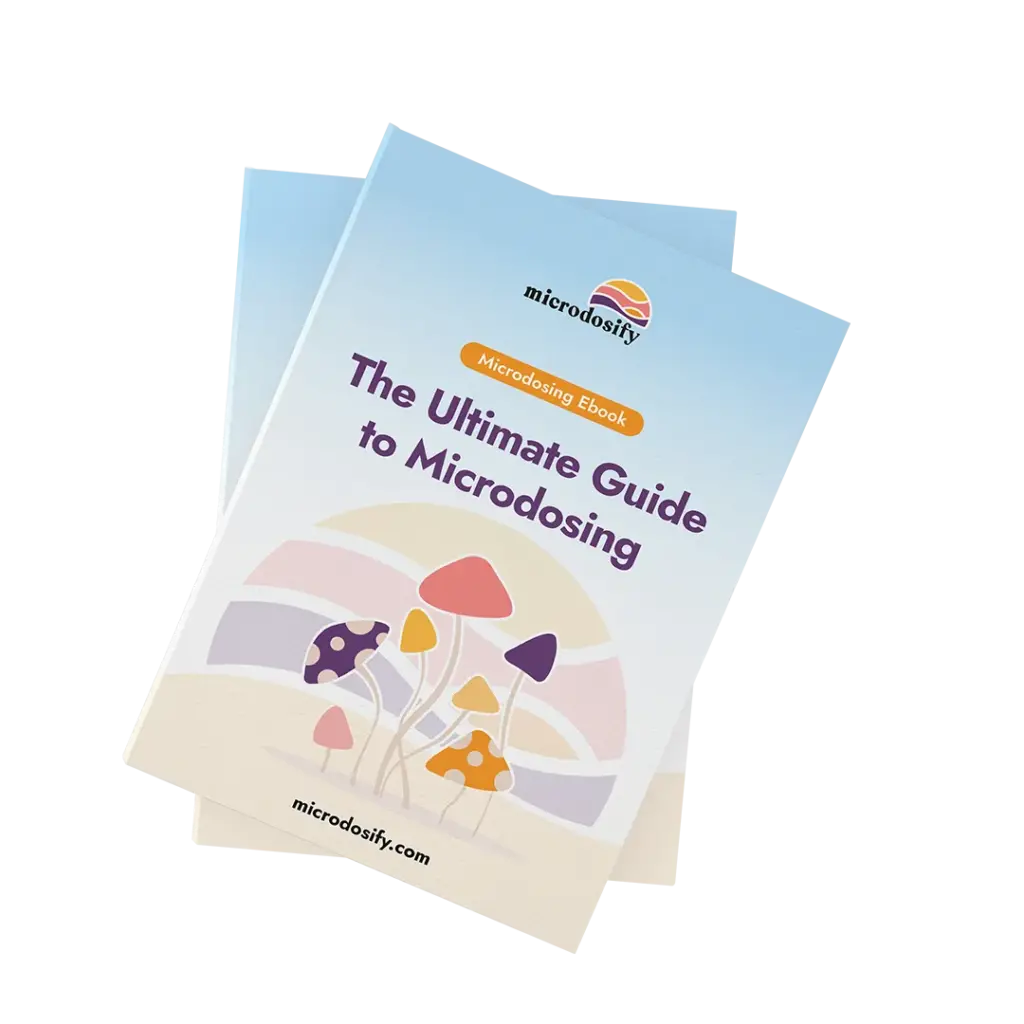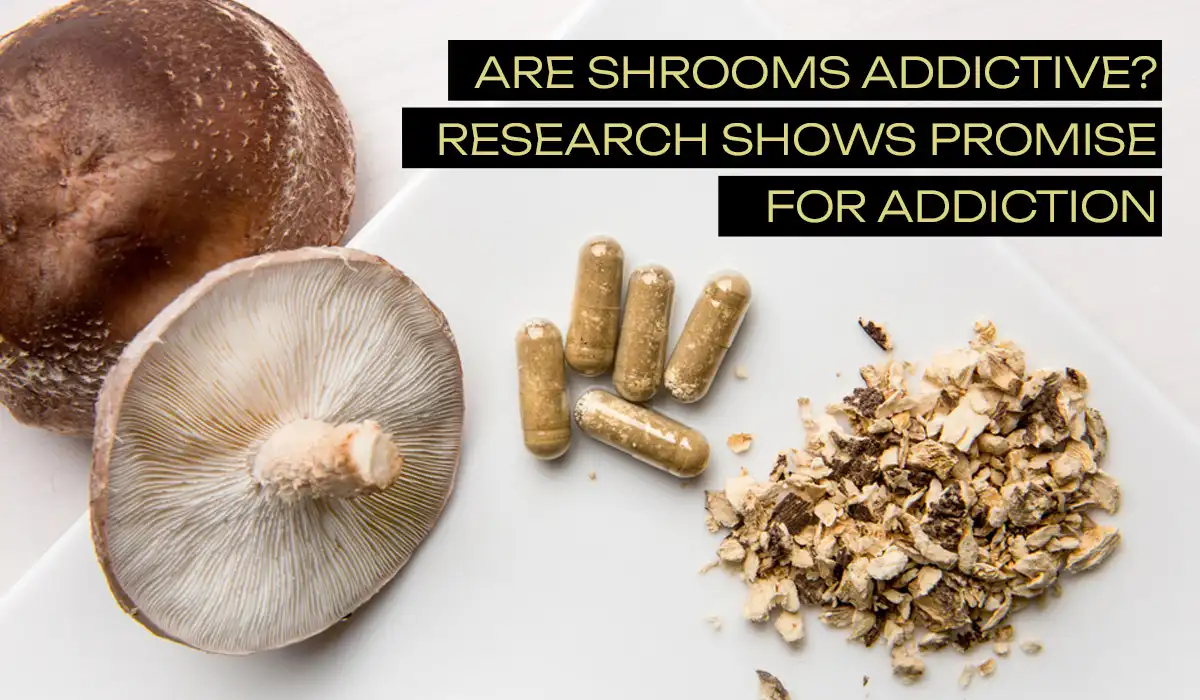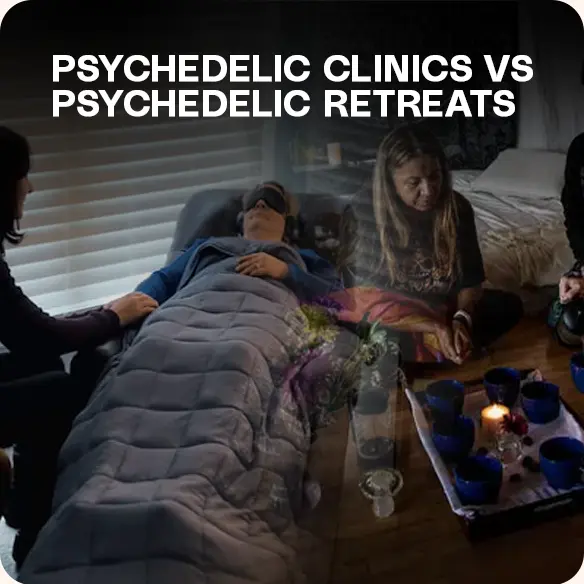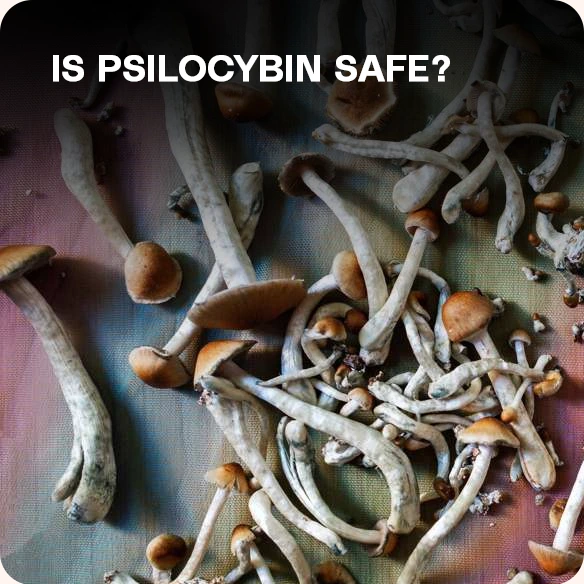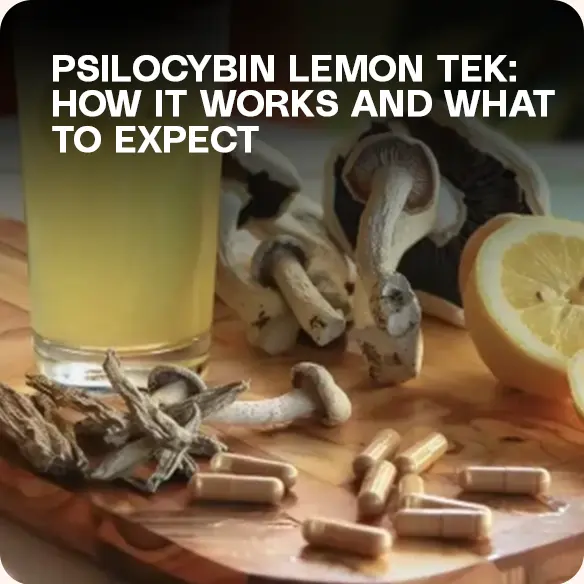Magic mushrooms are generally not considered physically addictive, but they can lead to psychological dependence in some individuals, especially those using them as a form of self-medication for anxiety or depression.
What Are Magic Mushrooms (Psilocybin)?
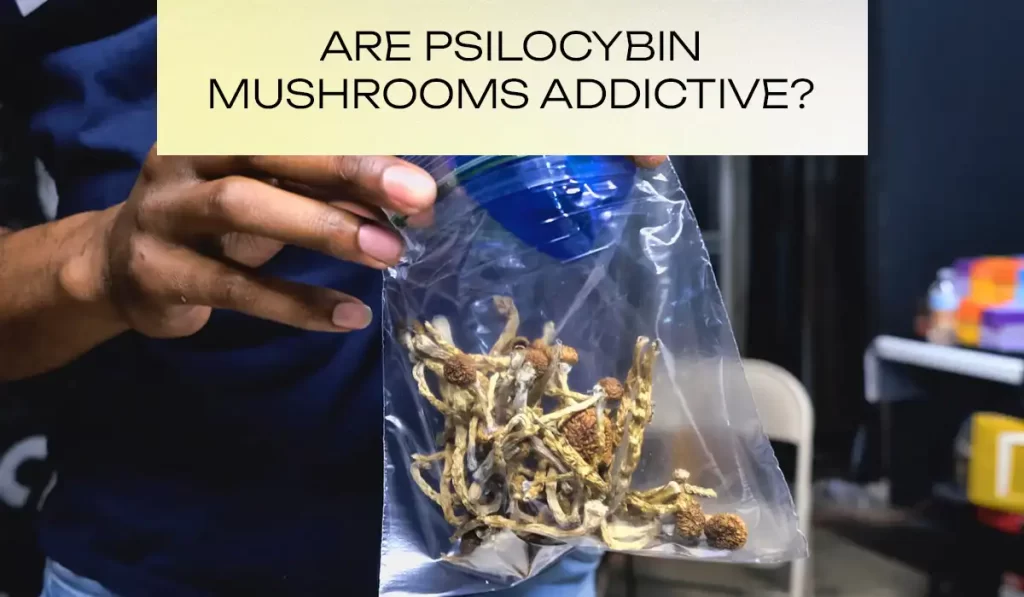
Magic mushrooms, also known as psilocybin mushrooms, are naturally-occurring fungi that contain the psychoactive compound psilocybin.
Studied for their holistic therapeutic effects in treating conditions like anxiety, depression, and PTSD, psilocybin mushrooms have raised attention within the field of psychology and medicine.
As research progresses, understanding their role in mental health recovery becomes relevant, especially in clinical settings.
Positive effects associated with the use of magic mushrooms:
- Uplifting feelings
- Altered thoughts
- Seeing problems from a positive perspective
- Synesthesia (blending of senses like tasting colors or seeing sounds)
- Increased Creativity
- Reduced suicidality
- Reduced anxiety
- Spiritual connection
- Relief of existential distress
- Mystical feelings
- Altered perception of space and time
- Dissociation
- Dilated pupils
- Improved Mental Clarity
Side Effects of Magic Mushrooms
While magic mushrooms are often known for their potential therapeutic benefits, they can also lead to a range of side effects, such as:
- Anxiety and Paranoia: Heightened anxiety, sometimes leading to panic attacks.
- Nausea and Vomiting: Common gastrointestinal discomfort.
- Increased Heart Rate: Elevated heart rate and blood pressure.
- Confusion and Disorientation: Difficulty concentrating and cognitive disturbances.
- Dizziness: Sensations of spinning or lightheadedness.
- Sweating: Excessive sweating during the experience.
- Dilated Pupils: Noticeable enlargement of pupils.
- Muscle Weakness: Feeling of physical weakness or fatigue.
- Panic Attacks: Sudden, intense fear and physical symptoms of panic.
- Emotional Volatility: Rapid changes in emotions and mood swings.
The impact of magic mushrooms is not limited to immediate experiences, as side effects can be categorized into short-term and long-term effects that depend on various factors, including dosage, personal health conditions, and the environment in which they are used.
- Short-term effects: These can manifest within hours of consumption and include nausea, anxiety, and vivid visual and auditory hallucinations.
- Long-term effects: After repeated use, some individuals may encounter persistent changes in mood and perception, potentially leading to conditions such as Hallucinogen Persisting Perception Disorder (HPPD).
It is important to recognize that the context of use—such as the setting and the mental state of the user—can greatly influence the experience.
Those with pre-existing mental health issues should use magic mushrooms with caution, as their side effects may be worse under certain conditions.
How Addictive Are Shrooms?
The question of whether magic mushrooms or shrooms are addictive is a complex one, primarily because they do not typically lead to physical dependence like many other substances.
While psilocybin has a low potential for addiction, some users may develop psychological dependence, particularly if they resort to self-medication for issues like treatment-resistant depression or anxiety.
Understanding addiction in the context of shrooms requires a closer inspection of the differences between psychological dependence and physical dependence.
Psychedelics like shrooms can lead to a psychological connection that some users find stimulating, especially when they seek relief from deep-seated emotional or mental health struggles.
Factors such as:
- Frequency of Use: Regular consumption can potentially change an individual’s mindset, creating a dependence on the experience they provide.
- Underlying Mental Health Issues: Pre-existing conditions can amplify the desire for shrooms as a coping mechanism, making it more difficult to maintain a healthy relationship with the substance.
- Social Influences: Peer pressure and social circles that normalize psychedelic use can encourage patterns that steer toward addiction.
Can You Overdose on Shrooms?
There have been no confirmed cases of fatal overdose directly attributed to psilocybin. Consuming large quantities can lead to intense and distressing psychological experiences, known as bad trips.
These experiences can include severe anxiety, paranoia, and confusion, which may necessitate medical intervention to ensure safety and comfort for the user.
Users should be aware that the effects of these mushrooms can vary significantly based on individual sensitivity, body weight, and mental health history.
It is often advised to start with a low dosage, typically between 1 and 2 grams of dried mushrooms, and cautiously increase if necessary.
Alongside this, it’s crucial to recognize the symptoms of an overdose, which may manifest as:
- Severe Agitation: Intense anxiety and agitation.
- Hallucinations: Extremely vivid and distressing hallucinations.
- Paranoia: Heightened paranoia and fear.
- Vomiting: Excessive vomiting and gastrointestinal distress.
- Hypertension: High blood pressure.
- Tachycardia: Rapid heart rate.
- Seizures: Risk of seizures in severe cases.
- Psychosis: Temporary psychosis or loss of touch with reality.
- Confusion: Significant confusion and disorientation.
- Loss of Coordination: Severe loss of motor skills and balance.
In extreme cases, these symptoms may require the presence of medical professionals.
Therefore, having someone sober to supervise can be a wise choice, especially during strong experiences.
To reduce the risk of overwhelming or harmful situations, it’s essential to prioritize responsible use and remain mindful of personal limits and circumstances.
Psilocybin Shroom Withdrawal
Psilocybin mushrooms are often considered to have a low risk of withdrawal symptoms compared to many addictive substances such as cocaine or heroin, but some users may experience psychological challenges, especially if they have developed a psychological addiction.
Symptoms of withdrawal can range from mild mood swings to significant emotional discomfort, impacting mental health and well-being.
Understanding these potential withdrawal symptoms is important for individuals navigating their relationship with psilocybin, particularly in the context of self-medication for anxiety or depression.
It’s important to note that while the psychological aspects of withdrawal are often less discussed, they can be quite significant.
People may face feelings of restlessness, irritability, or even a resurgence of anxiety symptoms. These emotional fluctuations can sometimes mirror the original problems the user sought to heal with psilocybin, creating a cyclical challenge.
- To manage these withdrawal symptoms, developing a support system can be invaluable.
- Engaging in mindfulness practices, such as meditation and yoga, may help ease emotional distress.
- Counseling or participating in support groups can offer essential coping strategies and community understanding.
Understanding and addressing these psychological challenges not only aids in a smoother transition but also reinforces a healthier perspective towards psilocybin use, promoting responsible and informed decisions.
Risk Factors Leading to Magic Mushroom Addiction
Several risk factors can contribute to the potential for magic mushroom addiction, particularly among people with a history of mental health issues or trauma.
Psychological dependence may develop when users seek out psilocybin as a form of self-medication for unresolved anxiety or depression, leading to patterns of substance misuse that can become problematic over time.
Furthermore, environmental factors such as social circles that encourage drug use or cultural acceptance of psychedelics can also play a significant role in addiction risk.
Treatment for Polydrug Addiction and Shroom Misuse
Treatment for polydrug addiction and magic mushroom misuse often requires a comprehensive approach that addresses the complexities of substance use disorders.
Effective rehabilitation programs typically incorporate therapeutic modalities such as cognitive therapy to help individuals uncover the underlying issues contributing to their dependence on psilocybin and other substances.
By providing personalized recovery plans, treatment facilities can help individuals navigate their journey towards mental wellness and sustainable sobriety.
Along with cognitive behavioral therapy, a variety of treatment options are available to address polydrug addiction. These might include:
- Dialectical Behavior Therapy (DBT): Particularly useful for those with emotional regulation issues, DBT helps individuals develop coping strategies and better manage their stress.
- Support Groups: Participating in community support groups, such as Narcotics Anonymous, can foster a sense of belonging and accountability while sharing experiences.
- Rehabilitation Programs: Comprehensive rehab programs offer medical detoxification, therapeutic activities, and aftercare support, focusing on both substance misuse and any co-occurring mental health conditions.
Addressing these elements is vital for long-term recovery, ensuring that individuals receive holistic care tailored to their unique circumstances.
Therapeutic Uses for Psilocybin
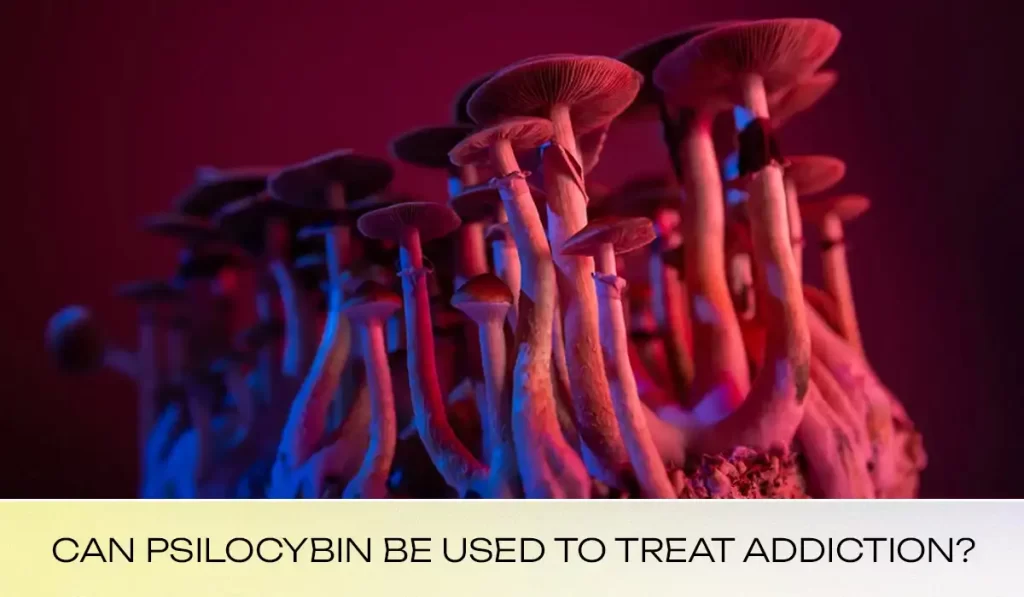
Psilocybin, the active compound in magic mushrooms, has gained attention within the medical community for its potential therapeutic uses, particularly in the treatment of mental health disorders such as depression and anxiety.
Clinical studies have shown promising results, indicating that psilocybin can induce profound psychological effects that may lead to lasting relief from debilitating symptoms, especially in treatment-resistant cases.
With the support of organizations like the FDA, research into psilocybin therapy is advancing rapidly, opening new avenues for understanding and addressing mental health challenges.
Frequently Asked Questions
Can mushrooms be addictive?
Yes, mushrooms can be addictive due to their primary compound, psilocybin, which can create a sense of euphoria and altered perception.
How does psilocybin affect the brain?
Psilocybin is converted into psilocin after ingestion, which then binds to serotonin receptors in the brain, leading to altered perception, mood, and thought patterns.
What are the potential risks of mushroom addiction?
Mushroom addiction can lead to negative consequences such as increased tolerance, withdrawal symptoms, and potential psychological dependence.
Is it possible to develop a tolerance to mushrooms?
Yes, regular use of mushrooms can lead to tolerance, which means that higher doses are needed to achieve the same effects, increasing the risk of addiction.
Are there any withdrawal symptoms associated with mushroom addiction?
Withdrawal symptoms such as headaches, irritability, and changes in mood have been reported in individuals who have stopped using mushrooms after regular use.
How can one prevent or overcome mushroom addiction?
Seeking professional help, practicing harm reduction techniques, and engaging in therapy can be effective ways to prevent or overcome mushroom addiction.
